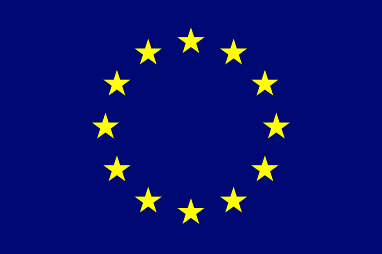Publications
Throughout the year, VOICE produces and disseminates key documents reflecting on humanitarian aid issues at the EU level and from an NGO perspective. They are addressed to decision-makers within the European institutions, at the National level, to NGO networks and other stakeholders of the humanitarian community, as well as to the VOICE members. Some documents are produced by the VOICE Secretariat with the support of VOICE members while others are publications from members and other key stakeholders in the humanitarian sector.
Please note that members-only documents will not be visible unless you are logged in.
-
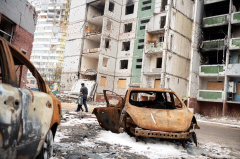
International humanitarian law versus international political will
03 April 2025VOICE out loudAn article by Brona Higgins, Senior Humanitarian Policy & Practice Advisor, from DanChurchAid in the VOICE Out Loud 38 provides a critical analysis of the growing gap between IHL and political will, highlighting the urgent need for states to uphold their legal obligations to protect civilians and humanitarian workers in conflict zones. -

Why not local? INGO statement on the urgent need to accelerate progress and accountability towards local leadership of humanitarian action - Joint Statement
09 October 2024Members' publicationsThis joint statement calls on the international community – notably donor governments, INGOs and UN agencies – to urgently accelerate efforts to promote and demonstrate equitable partnership with diverse local civil society organizations in humanitarian action. -
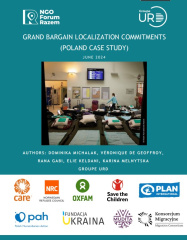
Grand Bargain Localization Commitments (Poland Case Study) June 2024
01 August 2024Members' publicationsThis report evaluates the involvement of international humanitarian actors in response to the challenges related to this forced migration movement, as compared against the Grand Bargain Localization Commitments. -

Interview with Jan Egeland - Eminent Person of The Grand Bargain and Secretary General of the Norwegian Refugee Council
11 July 2023VOICE out loudIn this interview, Jan Egeland, Eminent Person of The Grand Bargain and Secretary General of the Norwegian Refugee Council, provides an overview of the current state of the localisation agenda, the harmonisation process, quality funding, and other aspects related to the Grand Bargain. -
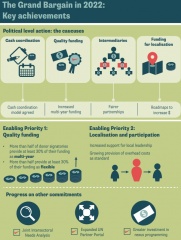
The Grand Bargain in 2022: Key achievements
30 June 2023This infographic presents the main achievements and gaps of the Grand Bargain in 2022. -
VOICE statement ahead of the European Humanitarian Forum 2022
14 March 2022In the statement, VOICE calls on the EU and its MS to use the European Humanitarian Forum as an opportunity to:
• Recommit and further strengthen their commitment to principled humanitarian aid
• Review and adjust the approach of the EU towards counterterrorism and restrictive measures
• Strengthen collective efforts to achieve the Grand Bargain (GB) 2.0 commitments
• Confirm commitments to the effective implementation of humanitarian protection and IHL
• Set up clear and measurable commitments to build climate resilience and adjust financial support and policies on greening humanitarian aid
• Review progress on and recommit to the inclusion of gender considerations into humanitarian action and policies.
-
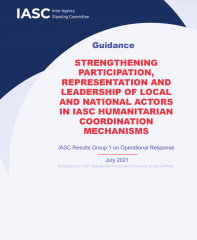
IASC Guidance: Strengthening participation, representation and leadership of local and national actors
13 August 2021This guidance note has been developed to support efforts to strengthen the meaningful participation, representation, and leadership of local and national humanitarian actors within IASC humanitarian coordination structures. It draws on over 100 pieces of research and good practice to provide recommendations. -
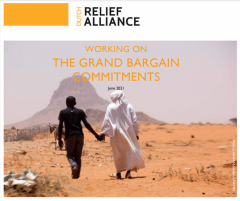
Dutch Relief Alliance - Working on the Grand Bargain Commitments
23 June 2021This report presents some of last year’s DRA's achievements in working towards the fulfilment of the Grand Bargain commitments. -
VOICE Policy Resolution 2021- Grand Bargain 2.0: let’s make it a turning point in the global humanitarian aid system
09 June 2021VOICE policy resolutionsVOICE calls on the EU and its Member States (MS) to make the GB 2.0 a real turning point in the humanitarian aid system through the adoption of the recommendations of the Policy resolution adopted by NGO members at the General Assembly 2021. -

Joint Agency Position on the Future of the Grand Bargain
29 April 2021Members' publicationsCare, Oxfam, Christian Aid, Dan Church Aid, Nexus, Save The Children, NEAR, ActionAid and International Rescue Committee joint position paper on the future of the Grand Bargain. -
Reducing the humanitarian financing gap: review of progress since the report of the High-Level Panel on Humanitarian Financing - ODI
27 April 2021In January 2016, the United Nations Secretary-General’s High-Level Panel on Humanitarian Financing (HLP) published its report Too important to fail – addressing the humanitarian financing gap, which formed the basis for the Grand Bargain negotiations in early 2016. Five years on, this report seeks to identify, assess and analyse initiatives taken in the spirit of the HLP’s recommendations under its two main pillars, and to identify possible links with progress on the Grand Bargain. -
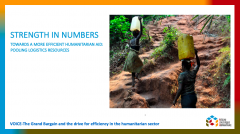
Power Point presentation HI - VOICE Webinar on the Grand Bargain and the drive for efficiency in the humanitarian sector
27 November 2020Power Point presentation on the Réseau Logistique Humanitaire shared by Handicap International/Humanity & Inclusion at the VOICE Webinar on the Grand Bargain and the drive for efficiency in the humanitarian sector (19 November 2020). -
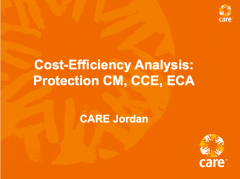
Power Point presentation CARE - VOICE Webinar on the Grand Bargain and the drive for efficiency in the humanitarian sector
27 November 2020Power Point presentation on Cost-Efficiency Analysis: Protection CM, CCE, ECA by CARE Jordan at the VOICE Webinar on the Grand Bargain and the drive for efficiency in the humanitarian sector (19 November 2020). -

Video recording of the VOICE Webinar on the Grand Bargain and the drive for efficiency in the humanitarian sector : Where do we stand? Discussing an NGO perspective with EU stakeholders
27 November 2020Video recording of the VOICE Webinar on the Grand Bargain and the drive for efficiency in the humanitarian sector : Where do we stand? Discussing an NGO perspective with EU stakeholders (19 November 2020). -
VOICE Grand Bargain Task Force Position Paper - An NGO perspective on the drive for efficiency in the humanitarian sector
17 November 2020VOICE position papersThis position paper sets out views expressed by members of the VOICE Grand Bargain Task Force to improve the humanitarian sector and to strive for more efficiency for the 167.6 million people in need of humanitarian intervention worldwide. There is an urgent need for European actors to follow up on the commitments made, and to put the people in need first by making our collective work more efficient. With this goal in mind, this position paper proposes recommendations to improve the efficiency of the humanitarian sector. -
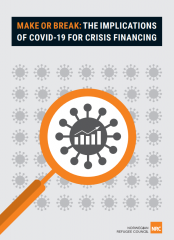
Make or break – the implications of Covid-19 for crisis financing
15 September 2020Members' publicationsThe Norwegian Refugee Council (NRC) commissioned this study to reflect on what the Covid-19 pandemic response tells us about the fitness of the international crisis financing system. The pandemic has provided a real-time stress test that demonstrates how the system performs under pressure and identifies opportunities for improvement.
The study coincides with a period in which humanitarian policymakers are taking stock of progress made under the Grand Bargain financing reforms and considering priorities for further reform. It also considers challenges and gaps not included in the Grand Bargain reforms. It reflects on the capacity of the international crisis financing system to respond to a new order of crises in an era when large-scale systemic risks may overlay and aggravate existing risks and needs. -
Engaging with local faith actors and communities - a toolkit
12 August 2020Members' publicationsThis toolkit is published by ACT Alliance EU, Caritas Europa, EU-CORD and Islamic Relief Worldwide to give EU decision-makers a concise practical tool to encourage engagement of local religious leaders and faith communities in pandemic response and the post-recovery phase. -
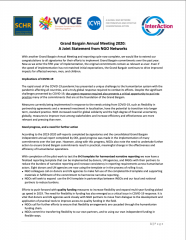
Grand Bargain Annual Meeting 2020: A Joint Statement from NGO Networks
29 July 2020Joint Statement from NGO Networks (SCHR, VOICE, ICVA and InterAction) following the 2020 Annual Grand Bargain Meeting. -
A Win-Win: Multi-year flexible funding is better for people and better value for donors
03 July 2020Members' publicationsThis report by International Rescue Committee (IRC), with support from Development Initiatives, builds on the already strong evidence base for multi-year flexible funding. A comparative analysis of two cash programmes in Somalia funded by DFID and Sida, which draws on data collected using the Systematic Cost Analysis (SCAN) tool developed by IRC with Save the Children and Mercy Corps, provides preliminary indications of quantifiable cost efficiency gains of multi-year funding. And three case studies—two multi-sector programmes in the Central African Republic and Camroon supported through Sida’s Programme-Based Approach (PBA) and a youth livelihoods programme in Côte d’Ivoire funded by the Mastercard Foundation—reveal the qualitative benefits of multi-year, flexible financing. -
-
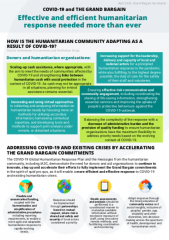
COVID-19 and the Grand Bargain: Effective and efficient humanitarian response needed more than ever
15 April 2020A 1-pager providing an overview of adaptations of the humanitarian response, and further steps needed to enable a more efficient and effective response to COVID-19 and existing humanitarian crises. -
Multi-year humanitarian funding: Global baselines and trends - Development Initiatives
11 March 2020A comprehensive breakdown of multi-year humanitarian funding, looking at long-term trends in donors, recipients and earmarking. Are Grand Bargain recommendations being met? -
Field perspectives on multi-year humanitarian funding and planning: How theory has translated into practice in Jordan and Lebanon
06 December 2019Members' publicationsThis research contributes important evidence on the reality of predictable and flexible funding in the field and identifies recommendations for the global Grand Bargain workstream on enhanced quality of funding. Jordan and Lebanon were selected as two sample contexts, given their protracted and relatively stable crisis contexts with a degree of comparability. -
Country-based pooled funds: The NGO perspective
06 December 2019Members' publicationsMore than 1,000 non-governmental organisations have worked in partnership with the UN Office for the Coordination of Humanitarian Affairs to implement the vast majority of funding channelled through country-based pooled funds. This study brings together their experiences and recommendations to improve a mechanism that has become a staple of the humanitarian landscape and financing toolbox. -
Towards a more inclusive and contextualized implementation of the Grand Bargain
03 September 2019VOICE event reportsFrom December 2017 to May 2019, the VOICE network implemented a project funded by the Belgium Ministry of Foreign Affairs, which aimed to contribute to a more inclusive and possibly a more contextualized implementation of the Grand Bargain (GB), by fostering NGOs' and frontline responders' engagement in the Grand Bargain. In the framework of this project, several workshops and events were organised at EU and at field level. The report summarises the main findings and recommendations of these events.

